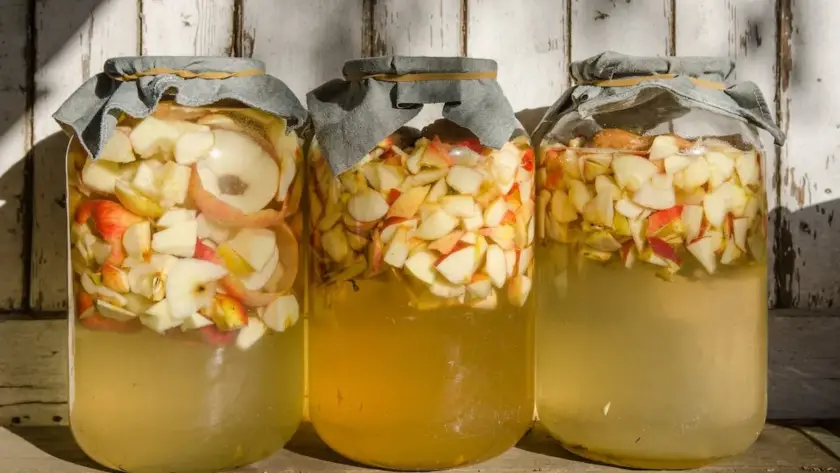Sore, scratchy throat and sinus congestion can make you miserable. While there are plenty of over-the-counter medications that promise relief, many people are looking for natural remedies. One popular solution is apple cider vinegar (ACV).
This versatile pantry staple has long been used as a home remedy for numerous health issues. Research shows ACV contains powerful antimicrobial and anti-inflammatory compounds that may ease throat pain and break up mucus. This article will explore how apple cider vinegar could help provide sore throat and congestion relief.
You’ll learn the science behind using ACV for these symptoms, get recipes to try at home, and find out the many other potential benefits of apple cider vinegar, like aiding digestion, blood sugar control, and weight loss. We’ll also discuss how to make your own raw, unfiltered ACV with just two ingredients.
What is Apple Cider Vinegar?
Apple cider vinegar is made from crushed apples that have been fermented. The main active component is acetic acid, which gives vinegar its sour taste and potent health benefits. Look for raw, unfiltered apple cider vinegar that contains the “mother” – a colony of beneficial bacteria that looks like cloudy strands and forms during fermentation. This type provides more health benefits than refined, clear vinegar.
Why Make Your Own?
Homemade apple cider vinegar takes weeks to ferment but is worth the wait. It retains more of the apple’s nutrients and beneficial enzymes compared to store-bought brands which are heavily processed and pasteurized. Plus, you can control the quality of the ingredients. All you need is some chopped apples, water, sugar, and a starter culture.
Sore Throat Remedy
Apple cider vinegar is thought to have antimicrobial effects against bacteria and viruses that cause sore throat. Its acetic acid content helps kill pathogens while also providing anti-inflammatory relief. To use ACV for a sore throat, mix 1-2 tablespoons into a cup of warm water. Gargle this mixture for 30 seconds before swallowing. The acetic acid can kill germs while the warmth soothes pain and inflammation.
You can also add honey, which coats the throat and further calms irritation. Repeat gargling with the ACV remedy every 2 hours for best relief. Its antibacterial properties make ACV an effective and versatile natural home treatment.
18 Other Benefits of Apple Cider Vinegar
-
Is a Natural Laxative and Improves Digestion
The acetic acid in apple cider vinegar is a natural laxative that can help relieve constipation and improve digestion. It speeds up transit time in the colon and makes elimination easier. Add 1-2 tablespoons to a glass of water and drink before meals.
-
Lowers Blood Sugar Levels
Several studies have found vinegar helps lower blood sugar spikes after meals, especially for those with insulin resistance. The acetic acid is thought to block some starch digestion and lower glycemic response.
-
Improves Insulin Sensitivity
Improving insulin sensitivity with apple cider vinegar can help manage diabetes. In one study, vinegar significantly increased insulin sensitivity by 34% during a high-carb meal.
-
Increases Satiety and Aids Weight Loss
Apple cider vinegar increases feelings of fullness and can lead to eating roughly 200-275 fewer calories per day. The acetic acid has been shown to reduce appetite and increase metabolism.
-
Reduces Belly Fat
Studies have shown daily apple cider vinegar consumption results in significant declines in belly fat. It naturally lowers abdominal fat accumulation.
-
Lowers Cholesterol
Apple cider vinegar is able to lower LDL (bad) cholesterol levels. In some studies, it also raised HDL (good) cholesterol. The acetic acid is thought to inhibit lipid oxidation.
-
Lowers Blood Pressure
Acetic acid has anti-hypertensive effects, meaning it reduces high blood pressure. Apple cider vinegar increases nitric oxide levels which help relax blood vessels.
-
Improves Heart Health
The antioxidants in apple cider vinegar prevent plaque build-up in arteries. Studies show vinegar reduces risk factors for heart disease like hypertension and high triglycerides.
-
Prevents and May Slow Cancer Growth
The antioxidants in apple cider vinegar can help prevent DNA damage that leads to cancer. It also slows the rate of cancer cell growth by killing damaging cells.
-
Is a Nutritional Powerhouse
ACV provides small amounts of vitamins, minerals, antioxidants and amino acids like magnesium, iron, phosphorus, B-vitamins, vitamin C, probiotics and polyphenols.
-
Boosts Immunity
The antioxidants and beneficial bacteria in apple cider vinegar can help boost your immune system and fight off harmful pathogens. It also decreases inflammation.
-
Balances pH
Although acidic, apple cider vinegar has an alkalizing effect on the body when metabolized. This helps balance pH levels for a healthier gut.
-
Treats Acne
Diluted apple cider vinegar applied topically can kill acne-causing bacteria. It also balances skin pH levels and absorbs excess oil.
-
Detoxifies the Body
Apple cider vinegar supports liver detoxification by helping flush out toxins and stimulate drainage. It also contains amino acids that bind to toxins.
-
Fights Fungal Infections
The anti-fungal properties of apple cider vinegar make it effective for treating nail fungus, athlete’s foot, jock itch and yeast infections.
-
Aids in Weight Training
Bodybuilders take apple cider vinegar before workouts because the amino acids help prevent lactic acid build-up and improve endurance.
-
Natural Skin Toner
Dilute ACV makes an excellent natural skin toner that can help balance skin pH and clear dirt and debris from pores.
-
Adds Shine to Hair
A quick apple cider vinegar hair rinse after shampooing helps smooth frizz and flyaways. It also gives hair a glossy sheen.
How To Drink Apple Cider Vinegar
Well, you don’t really have to drink it. Especially if you don’t like the taste. There are other ways to consume apple cider vinegar. You can incorporate apple cider vinegar into your diet by…
- Using it in various recipes including salad dressing recipes and marinade recipes.
- Making an apple cider vinegar tonic by mixing apple cider vinegar with lemon juice – 2 tablespoons of apple cider vinegar added to a glass of fruit juice. Drinking apple cider vinegar is easier this way. You won’t notice the taste as much but you’ll get all the health benefits of apple cider. Plus the benefits of fruit juice.
- If you don’t mind the taste of apple cider vinegar, you can add it to a glass of water and drink it. It’s as simple as that.
- If your not a fan of drinking ACV, using it as a seasoning or creating your own capsules can be a great solution and extremely cost effective.
-
Click Here To Check Out Organic ACV In Powder Form.
How Much ACV Should I Ingest?
This is important. Because you don’t want to overdo it. That’s never a good idea. So how much apple cider vinegar daily? And how much is too much?
Common dosage per day is 15-30 ml. Basically, 1-2 tablespoons of apple cider vinegar – mixed with water or made into a tonic or added to a salad dressing.
My advice is to start with a tablespoon and then increase to 2 tablespoons if you don’t notice any side effects. It can be quite strong at first, so you’ll want to get used to it.
Side view of a glass filled with apple cider vinegar with the bottle of organic apple cider vinegar behind the glass.
As a reminder, drinking apple cider vinegar without diluting it is not at all recommended because apple cider vinegar is acidic and can burn your esophagus lining and cause tooth decay.
How To Make Your Own ACV With The Mother
Ingredients
- Organic apple scraps
- 2 TBSP cane sugar
- 2 cups water (filtered)
Instructions
- Clean a quart jar very well and let air dry.
- Fill the jar ¾ full with apple scraps. If you are using whole apples, roughly chop them up before you put them in the jar.
- Dissolve the cane sugar into the cups of water.
- Pour sugar water over the apples until they are completely submerged. Add a little additional water if needed to make sure the apples are covered.
- Weigh down the apples with a fermentation weight or with the small glass jar. Any apples that are exposed to the air could mold.
- Cover with the cheesecloth or coffee filter and secure with the rubber band.
Store in a dark place at room temperature. I put mine in a cabinet in the kitchen.
Leave it for approximately 3 weeks. Check on it every few days to make sure the apples are staying under the water and to make sure no mold is growing. - After 3 weeks, it will still smell fairly sweet. Strain the apples pieces out and return the liquid to the jar. Compost the scraps.
- Recover and put the jar back in a dark spot for another 3-4 weeks, stirring every few days.
When the ACV has reached the “tartness” you like you can put a lid on it or transfer it to a different jar with a lid and start using it!
- When the ACV is finished you can save “the mother” that has floated to the top or just a small quantity of the finished ACV to start a new batch that will ferment more quickly.
Apple cider vinegar is a natural health tonic that has been used for centuries. Now modern research is confirming many of its purported benefits, from sore throat relief to aiding weight loss and beyond. Drinking diluted apple cider vinegar may help reduce blood sugar spikes, lower cholesterol, improve insulin sensitivity, and increase feelings of fullness that support weight management.
Apple cider vinegar contains antimicrobial properties that can eliminate bacteria and soothe sore throats. It also boasts anti-inflammatory compounds that may relieve sinus congestion. What’s more, apple cider vinegar is chock full of beneficial nutrients like probiotics, antioxidants, and amino acids.
Making your own raw, unfiltered apple cider vinegar at home is cost effective while also giving you control over the quality. All it takes is some organic apples, sugar, starter culture, and patience. The homemade version retains more nutrients than clear, refined vinegars.
While more research is still needed, adding 1-2 tablespoons of apple cider vinegar to your daily routine may benefit digestion, blood sugar control, immunity, and more. Just be mindful of potential side effects like eroding tooth enamel if taken straight. Dilute apple cider vinegar in water and drink before meals to maximize benefits while minimizing risk.






